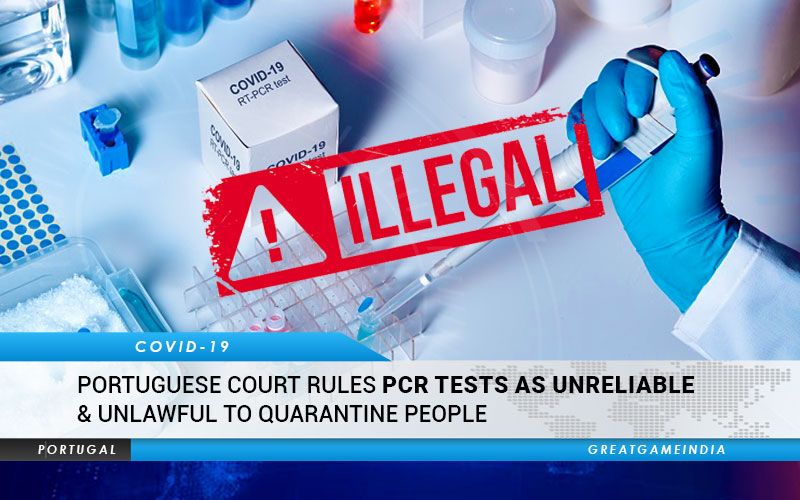Portuguese Court Rules PCR Tests As Unreliable & Unlawful To Quarantine People

A Portuguese appeals court has ruled that PCR tests are unreliable and that it is unlawful to quarantine people based solely on a PCR test.
The court stated, the test’s reliability depends on the number of cycles used and the viral load present. Citing Jaafar et al. 2020, the court concludes that:
if someone is tested by PCR as positive when a threshold of 35 cycles or higher is used (as is the rule in most laboratories in Europe and the US), the probability that said person is infected is less than 3%, and the probability that said result is a false positive is 97%.
The court further notes that the cycle threshold used for the PCR tests currently being made in Portugal is unknown.
The threshold cycles used in PCR tests in India is between 37 and 40, which makes the reliability of the PCR test less than 3% and the false positive rate as high as 97%.
This case concerned the fact that four people had been quarantined by the Regional Health Authority. Of these, one had tested positive for COVID using a PCR test; the other three were deemed to have undergone a high risk of exposure.
Consequently, the Regional Health Authority decided that all four were infectious and a health hazard, which required that they go into isolation.
The court’s summary of the case to rule against the Regional Health Authority’s appeal reads as follows:
Given how much scientific doubt exists — as voiced by experts, i.e., those who matter — about the reliability of the PCR tests, given the lack of information concerning the tests’ analytical parameters, and in the absence of a physician’s diagnosis supporting the existence of infection or risk, there is no way this court would ever be able to determine whether C was indeed a carrier of the SARS-CoV-2 virus, or whether A, B and D had been at a high risk of exposure to it.
It is also important to remember PCR was invented as a way to create copies of genetic material. Its was never intended to be a diagnostic tool.
The standard coronavirus tests are throwing up a huge number of positive cases daily. These tests are done based on faulty WHO protocols which are designed to include false positives cases as well.
This fact about false positives of PCR Tests was first noted in public by Dr. Beda M. Stadler, a Swiss biologist, emeritus professor, and former director of the Institute of Immunology at the University of Bern.
So if we do a PCR corona test on an immune person, it is not a virus that is detected, but a small shattered part of the viral genome. The test comes back positive for as long as there are tiny shattered parts of the virus left. Correct: Even if the infectious viruses are long dead, a corona test can come back positive, because the PCR method multiplies even a tiny fraction of the viral genetic material enough [to be detected].
Earlier, the WHO’s testing protocol was even questioned by Finland’s national health authority.
Read the full article at GreatGameIndia.com.
Comment on this article at HealthImpactNews.com.
Having problems receiving our newsletters? See:
How to Beat Internet Censorship and Create Your Own Newsfeed
Support the case against Medical Kidnapping by purchasing our new book!
If you know people who are skeptical and cannot believe that medical kidnapping happens in the U.S. today, this is the book for them! Backed with solid references and real life examples, they will not be able to deny the plain evidence before them, and will become better educated on this topic that is destroying the American family.
1 Book – 228 pages
Retail: $24.99
FREE Shipping Available!
Now: $14.99
Order here!
2 Books
Retail: $49.98 (for 2 books)
FREE Shipping Available!
Now: $19.99 (for 2 books)
Order here!
Original source: https://medicalkidnap.com/2020/11/18/portuguese-court-rules-pcr-tests-as-unreliable-unlawful-to-quarantine-people/













